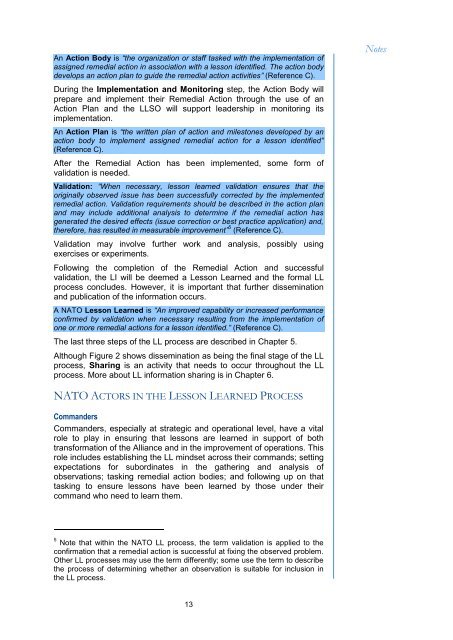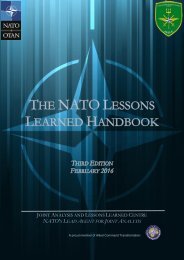JOINT ANALYSIS LESSONS LEARNED CENTRE NATO'S LEAD AGENT JOINT ANALYSIS
1ViofYb
1ViofYb
You also want an ePaper? Increase the reach of your titles
YUMPU automatically turns print PDFs into web optimized ePapers that Google loves.
An Action Body is “the organization or staff tasked with the implementation of<br />
assigned remedial action in association with a lesson identified. The action body<br />
develops an action plan to guide the remedial action activities” (Reference C).<br />
During the Implementation and Monitoring step, the Action Body will<br />
prepare and implement their Remedial Action through the use of an<br />
Action Plan and the LLSO will support leadership in monitoring its<br />
implementation.<br />
An Action Plan is “the written plan of action and milestones developed by an<br />
action body to implement assigned remedial action for a lesson identified”<br />
(Reference C).<br />
After the Remedial Action has been implemented, some form of<br />
validation is needed.<br />
Validation: “When necessary, lesson learned validation ensures that the<br />
originally observed issue has been successfully corrected by the implemented<br />
remedial action. Validation requirements should be described in the action plan<br />
and may include additional analysis to determine if the remedial action has<br />
generated the desired effects (issue correction or best practice application) and,<br />
therefore, has resulted in measurable improvement” 5 (Reference C).<br />
Validation may involve further work and analysis, possibly using<br />
exercises or experiments.<br />
Following the completion of the Remedial Action and successful<br />
validation, the LI will be deemed a Lesson Learned and the formal LL<br />
process concludes. However, it is important that further dissemination<br />
and publication of the information occurs.<br />
A NATO Lesson Learned is “An improved capability or increased performance<br />
confirmed by validation when necessary resulting from the implementation of<br />
one or more remedial actions for a lesson identified.” (Reference C).<br />
The last three steps of the LL process are described in Chapter 5.<br />
Although Figure 2 shows dissemination as being the final stage of the LL<br />
process, Sharing is an activity that needs to occur throughout the LL<br />
process. More about LL information sharing is in Chapter 6.<br />
Notes<br />
NATO ACTORS IN THE LESSON <strong>LEARNED</strong> PROCESS<br />
Commanders<br />
Commanders, especially at strategic and operational level, have a vital<br />
role to play in ensuring that lessons are learned in support of both<br />
transformation of the Alliance and in the improvement of operations. This<br />
role includes establishing the LL mindset across their commands; setting<br />
expectations for subordinates in the gathering and analysis of<br />
observations; tasking remedial action bodies; and following up on that<br />
tasking to ensure lessons have been learned by those under their<br />
command who need to learn them.<br />
5 Note that within the NATO LL process, the term validation is applied to the<br />
confirmation that a remedial action is successful at fixing the observed problem.<br />
Other LL processes may use the term differently; some use the term to describe<br />
the process of determining whether an observation is suitable for inclusion in<br />
the LL process.<br />
13



